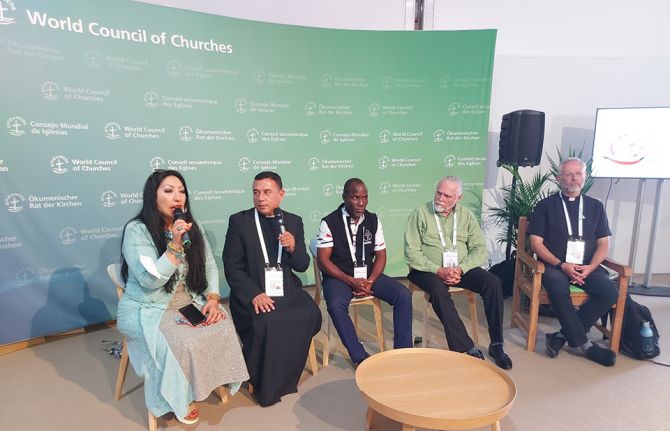

Feature Story
People living with HIV speak loudly and clearly at World Council of Churches Assembly
07 September 2022
07 September 2022 07 September 2022The 11th Assembly of the World Council of Churches (WCC) is meeting in Karlsruhe, Germany, from August 31 to September 8, 2022. The WCC brings together delegates and participants from 345 denominations from around the world, representing more than 500 million Christians.
Faith leaders and activists living with HIV expressed huge concerns for the future of the HIV response. Young people continue to be exposed to HIV; women are experiencing violence in all forms. Governments are moving away from HIV and many ecumenical organizations too.
What we need is a continued engagement with people with HIV and those at risk.
My country depends on international aid, what if we stop having that support?”, said one faith leader.
Another said, “Adolescents and children are not staying on medication, they are getting sick and some of them are dying”. Time is running out for the HIV response, we have to help people to live and stay safe and healthy.
People with HIV in the WCC Assembly are speakers and are leading plenaries, workshops and ecumenical conversations. They are bringing attention to the role of the church and the ecumenical movement to continue responding to the HIV epidemic; not only in relation to HIV stigma, but also in advocacy for a sustainable response to HIV, gender justice, human sexuality and the work on HIV related intersectionality and inequalities. This is a matter of justice, love and reconciliation.
The third thematic plenary Affirming the wholeness of life, included input from Canon Gideon Byamugisha from Uganda. He spoke about the realities of young people exposed to HIV and the consequences of unequal access to COVID-19 vaccines, because of unfair patent systems. He shared his experience of receiving support from Bishop Samuel Ssekkadde in 1998 who was leading the Anglican Church in Uganda and how that support saved his life when he was about to die without access to HIV medications. For many people with HIV, that continues to be a reality today.
Canon Gideon Byamugisha is one of the founders of INERELA+ (International Network of Religious Leaders Openly Living or Affected by HIV). He asked the Assembly participants to adopt the targets of the Global AIDS Strategy: the 95-95-95 strategy, which means that 95% of people living with HIV should be tested, 95% of those, should be on treatment and 95% of those, should have undetectable viral load, meaning that they can no longer transmit HIV and can stay healthy.
On September 2, five faith leaders openly living with HIV shared local experiences of churches responding to HIV stigma. In Argentina, some churches are taking care of transgender, indigenous women living with HIV; in Ghana, other churches are promoting the message of undetectable HIV = untransmitable HIV. In the United States, faith based organizations are providing affordable housing for people living with HIV who are transitioning out from rehabilitation or from the penitentiary system. Churches in Kenya are caring for children orphaned by HIV and they provide care and accompaniment for women who experienced sexual violence.
The workshop presented the results of a six-month case study recently completed by the WCC and Emory University. “We emphasize stigma because we know that it is a major driver of the HIV epidemic,” said Dr. David Barstow, one of the workshop organizers. “And we emphasize the role of local churches because of the influence they have on their members and on the rest of society. Local churches, indeed local communities of all faith traditions, are key to eliminating stigma and are therefore key to ending the epidemic.”
Some of the preliminary findings of the study refer to the role of people living with HIV who have a deeper understanding of stigma because of their lived experience. According to Professor John Blevins, who led the case study team, “…in the case study, when people living with HIV talk about stigma, they describe complexities that are often not apparent to people who do not live with HIV”
One faith leader said that “…despite my congregation’s commitment to stigma reduction, many people with HIV still feel uncomfortable disclosing our status.” The stigma was perceived as something that comes from those “on top” in the church. Another faith leader said, “Every time one of them dies, I die a little bit myself.”
The church and faith communities have much work to do in relation to HIV stigma. “We should be part of the healing hands of God to the world,” said Gracia Violeta Ross, a woman openly living with HIV, who is now leading the Ecumenical HIV & AIDS Initiatives and Advocacy in WCC. Canon Gideon Byamugisha said “…zero percent of our members should feel stigmatized. Surely, we want that going to church should be good for your health!”



